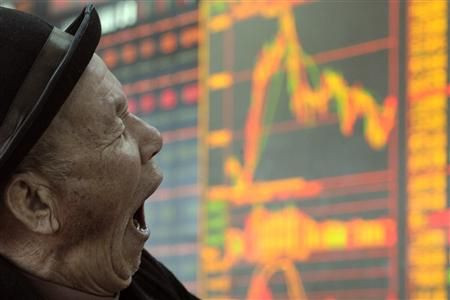Asian Stocks Rise On Japan Stimulus Expectations

Most of the Asian markets rose Tuesday amid hopes that the Bank of Japan will soon announce stimulus measures to regain the economic growth momentum.
Japan's Nikkei Stock Average was down 0.16 percent or 14.57 points to 9025.28. Among the major gainers were Alps Electric Co Ltd (3.63 percent), Hino Motors Ltd (2.45 percent) and Advantest Corp (2.32 percent).
China’s Shanghai Composite marginally rose 0.02 percent or 0.52 points to 2133.28. Markets in Hong Kong are closed for a holiday.
South Korea’s KOSPI Composite Index dropped 0.25 percent or 4.85 points to 1936.74. Shares of Samsung Electronics Co Ltd rose 0.23 percent and those of Hyundai Motor Co declined 0.22 percent.
India's BSE Sensex fell 0.13 percent or 24.01 points to 18769.43. Among the major losers were Hero MotoCorp (1.08 percent), Infosys (0.85 percent) and Tata Steel (0.78 percent).
Last month, the BoJ announced stimulus measures in an attempt to rejuvenate the country’s economy. This increased the size of its asset purchases by 10 trillion yen ($127 billion) to 80 trillion yen. The central bank decided that the increased amount would be used for purchasing the treasury discount bills and Japanese government bonds.
However, the central bank maintains that the concerns about the condition of the global economy persist, especially because of the debt burden faced by the euro zone. Earlier this week, the BoJ indicated that the general business conditions in the manufacturing sector in Japan worsened in the quarter ending Sept. 30, indicating that the country’s economy continued to be affected by the weakening of exports due to the soft global demand.
Japan's economy grew 0.3 percent in the second quarter, down from 1.2 percent in the first three months of the year. Market players sense that more measures, other than the currently available stimulus, will be required to revive the growth momentum.
Also Japan’s Finance Ministry data showed Monday that the country recorded 558.6 billion yen ($7.0 billion) trade deficit in September, compared to a surplus of 288.8 billion yen last year. Exports dropped 10.3 percent in September from a year earlier, indicating the soft global demand.
The continuing debt crisis in Europe and the strength of the Japanese yen have hurt the demand for exports, the key driver of Japan's economy. Meanwhile, imports rose 4.1 percent in September from the previous year as the nuclear energy crisis has resulted in the increased need of oil and gas.
© Copyright IBTimes 2024. All rights reserved.





















